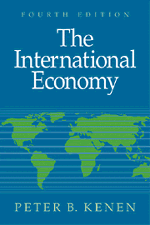Book contents
- Frontmatter
- Contents
- Preface
- PART ONE INTRODUCTION
- 1 The Nation as an Economic Unit
- PART TWO INTERNATIONAL TRADE THEORY AND POLICY
- PART THREE INTERNATIONAL MONETARY THEORY AND POLICY
- Appendix A Mathematical Notes on Trade Theory and Policy
- Appendix B Mathematical Notes on Monetary Theory and Policy
- Appendix C Outlines of Answers to Selected Problems
- List of Abbreviations
- Index
1 - The Nation as an Economic Unit
Published online by Cambridge University Press: 05 June 2012
- Frontmatter
- Contents
- Preface
- PART ONE INTRODUCTION
- 1 The Nation as an Economic Unit
- PART TWO INTERNATIONAL TRADE THEORY AND POLICY
- PART THREE INTERNATIONAL MONETARY THEORY AND POLICY
- Appendix A Mathematical Notes on Trade Theory and Policy
- Appendix B Mathematical Notes on Monetary Theory and Policy
- Appendix C Outlines of Answers to Selected Problems
- List of Abbreviations
- Index
Summary
ORIGINS AND ISSUES
The study of international trade and finance is among the oldest specialties in economics. It was conceived in the sixteenth century, a child of Europe's passion for Spanish gold, and grew to maturity in the turbulent years that witnessed the emergence of modern nation states. It attracted the leading economists of the eighteenth and nineteenth centuries, including David Hume, Adam Smith, David Ricardo, and John Stuart Mill, whose work supplied a legacy of insights and concepts that continue to guide us today. In fact, their work on international economic problems produced important analytical tools used by modern economics. An early version of the quantity theory of money was developed by David Hume to show how foreign trade affects the level of domestic prices. The first full formulation of the law of supply and demand was developed by John Stuart Mill to explain how prices are determined in international markets. International problems have been studied by many recipients of the Nobel Prize in economics, including Paul Samuelson, Wassily Leontief, Bertil Ohlin, and James Meade.
International economics continues to flourish today because the analytical and policy issues that brought it into being still demand attention.
By engaging in international trade, each national economy can use its resources most efficiently, concentrating on the activities it is best suited to pursue, and can reap significant economies of scale. In consequence, trade raises real income in each country.
- Type
- Chapter
- Information
- The International Economy , pp. 3 - 16Publisher: Cambridge University PressPrint publication year: 2000



